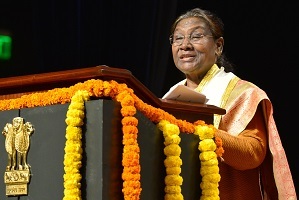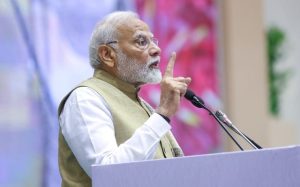New Delhi : –
- 39 senior officers from various key ministries and departments attended the program
- “Country witnessing major infrastructure developments across various sectors” DG NCGG
The two weeks program on Capacity Building Programme on “Project and Risk Management for Public Works for the officers from Republic of Tanzania” was successfully completed today at the National Centre for Good Governance (NCGG), New Delhi. The program was organized from 6th May, 2024 to 17th May, 2024 in partnership with the Ministry of External Affairs (MEA), Government of India. A total of 39 officers representing various organizations and ministries in Tanzania such as National Roads Agency, Ministry of Energy, Planning Commission, Tanzania Building Agency, Tanzania Railway Corporation, Housing Investments, Rapid Transit Agency, E-government Authority, Energy and Water Regulatory Authority, President’s Office Public Service Management and Good Governance, Regional Administration and Local Government, Livestock and Fisheries among others attended the program.
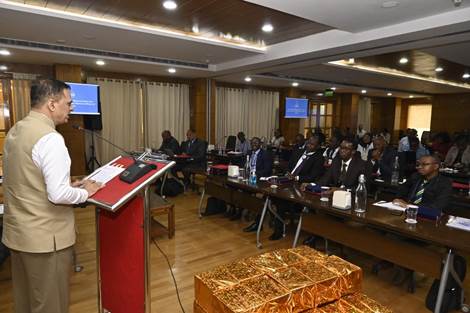
Shri V. Srinivas, Director General, National Centre for Good Governance (NCGG) and Secretary, Department of Administration Reform and Public Grievances (DARPG) in his valedictory address complemented the participating officers for making three insightful presentations on “Highlights of Key Takeaways on Project & Risk Management in Public Projects in Tanzania” “Project Planning, Execution and Delivery: Experiences from Dodoma City Outer Ring Road” and “Stakeholders Involvement & Consensus Building in Public Projects: Case Study of DART Project in Tanzania” as part of the learning outcomes from the programme.
Secretary, DARPG elaborated on the major infrastructure developments being undertaken in the country in scope, scale and size in various sectors such as railways, ships and ports. He discussed how the officers can learn from the best practices as well as risk assessments being undertaken in the country and undertake similar large successful projects in their country.
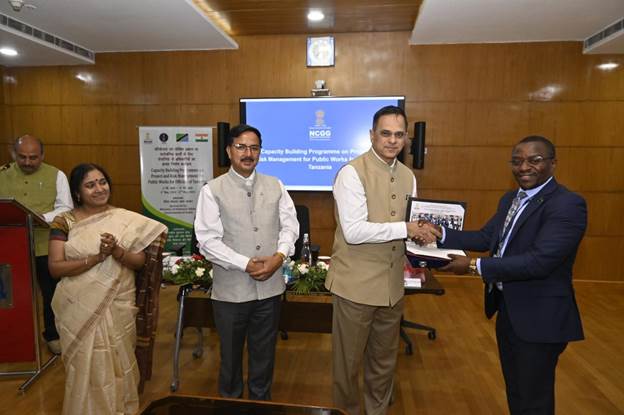
Speaking on the occasion Mr. George Nsavike Ndatta, Head of the Delegation expressed gratitude to the Indian Government for extending such a warm hospitality and providing this immensely useful opportunity to facilitate knowledge exchange. He expressed immense desire to adopt key elements for the development of country, especially with experiences gained about the world renowned projects being developed by India. He expressed that the objective was to empower by gaining requisite skills in area of project and risk management and fill the existing gaps and secondly to articulate short term and long term cooperation and learn from India’s successful implementation of several key projects and policies over the last decade.
Dr. B.S Bisht, Associate Professor and Course Coordinator gave a comprehensive overview of the programme and highlighted the core objectives of the two-week training program, which was customized to equip officers with essential skills in Project and Risk Management for Public Works, while showcasing several projects and works in several important sectors relevant to the participants. He elaborated how the programme is designed for officers who are at decision making level and is aimed at equipping them with the cutting-edge knowledge, skills and tools to deliver and design effective public works projects, which will lead to achievement of good governance and ultimately sustainable development apart from providing a rich cross-country experience so that there is no need to reinvent the wheel.
He discussed how the programme covered a diverse range of topics such as Project Selection and Formulation, Project Management Framework and Processes, Project Risk Management, PPP in Infrastructure Projects, Smart and Resilient Cities, Innovation in Awarding Public Projects and Managing Rural and Urban Housing Projects. Additionally, the program incorporates immersive field visits, with officers slated to visit key project sites such as Dakpathar Hydropower and Irrigation Dam, NHAI in Uttarakhand, Dwarka Expressway in New Delhi, Indira Paryavaran Bhawan, World Trade Centre NBCC in New Delhi, and the Delhi Metro Rail Corporation, culminating with a visit to the iconic Taj Mahal.
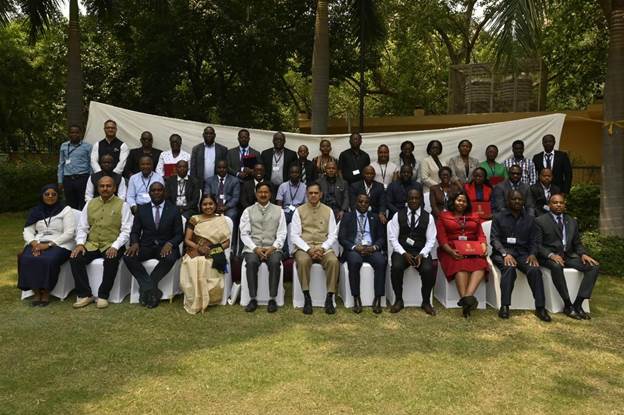
The National Centre for Good Governance, an autonomous institution under the Department of Administrative Reforms and Public Grievances, Ministry of Personnel, Public Grievances and Pensions, Government of India, is committed to action research, studies, and capacity building at both the national and international levels. NCGG’s efforts align with the Indian philosophy of ‘Vasudhaiva Kutumbakam’ i.e. “The world is one Family” and emphasizes strengthening bilateral ties and fostering cooperation with other countries. The capacity building program focused on providing a rich cross country experience and a platform for policy dialogue, while sharing best practices focusing on project and risk management in various sectors. This resulted in the officers gaining valuable insights into the manner in which projects are planned and executed and institutions are being transformed and people are getting closer to the government.
The NCGG has in partnership with MEA, NCGG successfully imparted training to civil servants of 17 countries viz. Bangladesh, Maldives, Kenya, Tanzania, Tunisia, Seychelles, Gambia, Sri Lanka, Afghanistan, Laos, Vietnam, Nepal Bhutan, Myanmar, Ethiopia, Eretria and Cambodia with requests being received from several countries for collaboration in the area of capacity building for civil servants.
The entire capacity-building program was supervised by Dr. B.S. Bisht, Associate Professor and Course Coordinator, Dr. Sanjeev Sharma, Associate Course Coordinator, Shri Brijesh Bisht, Training Assistant with the able support of dedicated training team of the NCGG.
***


